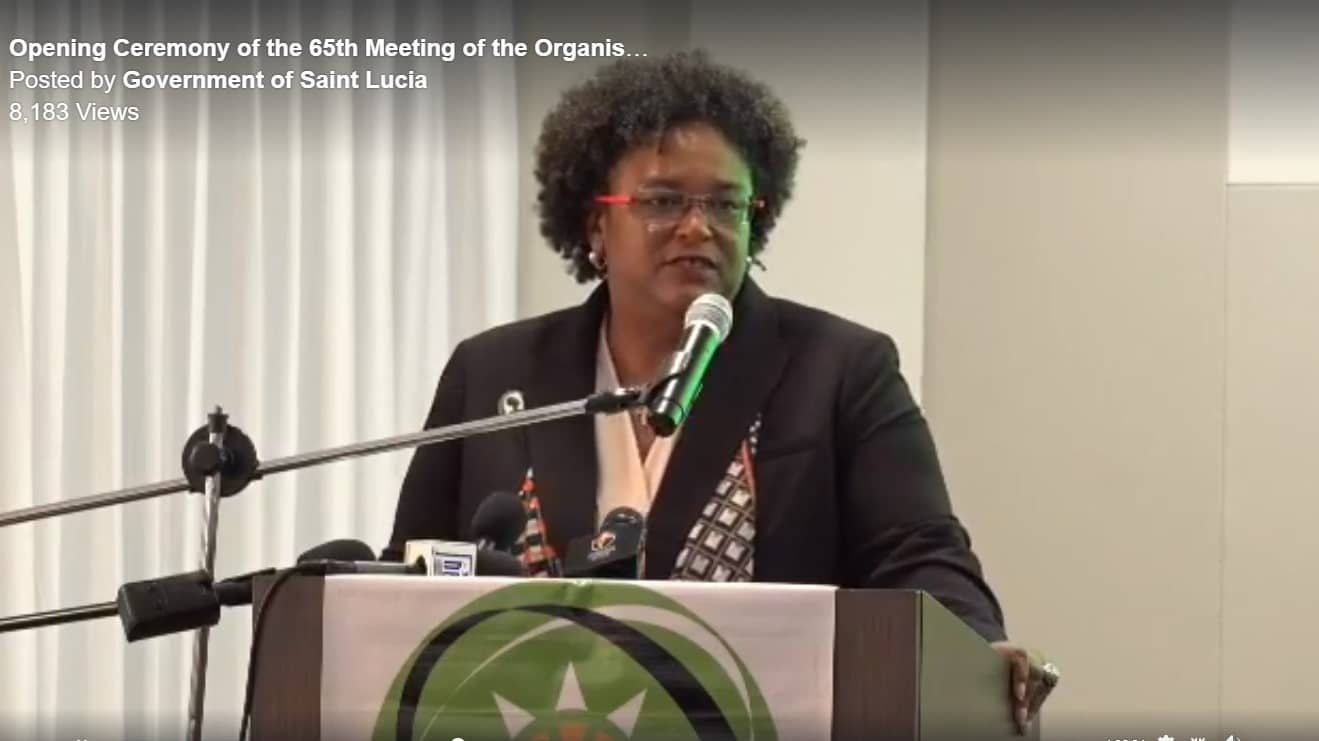
A weeklong conference discussing priorities and solutions to tackle climate and disaster risks began here on Monday amid calls for a new paradigm towards development and concerns that the region continues to be marginalised in its efforts to become climate resilient.
More than 500 delegates from 20 Caribbean countries are attending the Understanding Risk (UR) Caribbean Conference that is organized by the World Bank in partnership with the Barbados government, the Caribbean Disaster Emergency Management Agency (CDEMA) and the European Union (EU).
Prime Minister Mia Mottley told the delegates that while there was need for the Caribbean countries to establish a sinking capital fund to meet some of its developmental needs “the lumpy nature of the investment is such that we have in my view to make serious decisions as nation first and foremost to protect the fund by embedding it in our constitution…

“But secondly we may have within the limited capacity of what you can earn within a small economy…to protect and to preserve areas that will guarantee a level of revenue in order to be able to ensure that we can replace the critical infrastructure when needed”.
She said for example, everyone is interested in renewable energy but that it represents more than anything else “the patrimony of the particular region.
“And if we therefore are to ensure and guarantee our own survival it is my humble view that we may need to, particularly where we have public water infrastructural firms to preserve a portion of the market for our water authority’s to work in order to be able to help fund that sinking fund that is dedicated to capital infrastructure so that there is no but or ifs as to how we can meet the target with respect to the replacement of the mains as we go forward,” she said, noting that in the case of Barbados, a significant amount of cash is needed to undertake the exercise of replacing an aging water distribution system.
But Mottley said that while Caribbean countries had in the past undertaken several policies to ensure their socio-economic development it was now critical ‘to engage those who have placed us on the front line of this battle” of climate change and resilience.
She said that for more than 25 years “we have literally tried to sustain an argument against a one size fit all prescription and that recognises that the inability to distort global trade in goods and services ought to matter because there is a disproportionate consequence to enterprises within our region who in many instances were forced to either shut down production or to become marginalised because the removal of non-tariff barrier…as a result of our becoming signatory to the World Trade Organisation (WTO).”
Mottley said the region’s participation in the global trading bloc was intended to bring sustainable development and progress.
“If we were unsuccessful then for those decades, it causes me to wonder how successful we shall be now with respect to the acknowledgement by the rest of the world that these countries remain on the frontline of a war that we did not start nor do we sustain”.
She said that if the images of people responding to the destruction caused by hurricanes and earthquakes in the Caribbean are to mean something there must therefore be the change to” the continued belief that countries can be graduated on the basis of middle income status, purely on GDP (gross domestic product) and precluded from access to critical funding to be able to modernise their infrastructure”.
She said in the face of inherent vulnerability, the issue now has to become “a historic topic rather than a fight we are continuing to wage on a daily basis”..
She said she is aware of the extent to which global politics and power relations have been allowed “to literally creep in to the determination as to who can benefit and who shall not benefit”.
She said while she fully accepts that the efforts to maintain the status quo are not at the level of the technocrats “but at the level of capitals.
“This is unsustainable and we have to determine that if we really want to be able to make progress against the battles that cause tremendous risk such that we can become resilient then we need to start doing things differently and we need to start recognising first and foremost that failure to act is largely because you do not believe that the problem is important enough to guarantee such action”.
She said there is also a need to recognise that “we need 1.5 to survive, a reference to the region’s climate change call for “1.5 to Survive” global warming.
“Ask yourself on what basis can there be a sustainable platform for international cooperation and development if the very right to life and the very right to the sustainable nature to sustaining our societies is not accepted as a pre-requisite for action,’ she asked the conference.
The organisers said that during the week-long conference, three regional programmes supporting Caribbean countries to plan for long-term resilience and climate-smart growth strategies will be launched, including the Caribbean Regional Resilience Building Facility and the Technical Assistance Program for Disaster Risk Financing and Insurance in Caribbean Overseas Countries and Territories financed by the European Union, as well as the Canada Caribbean Resilience Facility financed by the Government of Canada.
The US$31 million Caribbean Regional Resilience Building Facility will support 15 Caribbean countries by providing technical assistance to mainstream resilience, leveraging investments to reduce vulnerability, and expanding financial protection against disasters.
The second EU funded program provides US$3.4 million to support Caribbean Overseas Countries and Territories (OCTs) in assessing their financial exposure to disasters, the feasibility of participating in insurance mechanisms, and to share knowledge among OCTs.
The US$15.2 million “Canada Caribbean Resilience Facility (CRF)” will boost capacity in nine Caribbean countries to achieve more effective and coordinated disaster preparedness, recovery and resilience building, and public financial management practices. The facility will be managed by the World Bank’s Global Facility for Disaster Reduction and Recovery (GFDRR).
The organisers said that the conference provides an opportunity to bring together disaster risk management practitioners with governments, urban planners, insurance industry stakeholders, private sector organizations, academia, multilateral development banks, and other regional partners to collectively take action to address and reduce disaster risk.
It will feature demonstrations hosted by institutions and organizations such as the University of the West Indies, Harvard University, NASA, the Organization of Eastern Caribbean States (OECS) and the United Nations Office for Disaster Risk Reduction among others.
Advertise with the mоѕt vіѕіtеd nеwѕ ѕіtе іn Antigua!
We offer fully customizable and flexible digital marketing packages.
Contact us at [email protected]
















